It takes a lot of Joes to make a sound you can hear.
Iron Crow Theatre is on fire right out of the gate with its fantastic season opener, The Cradle Will Rock. Under the expert direction of Artistic Director Sean Elias, this Brechtian revival hits all the right notes – notes sadly still relevant 80 years after its Broadway opening was shut down by the federal government for fear it would incite riots.
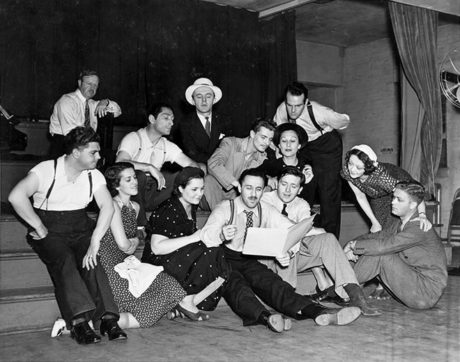
Please indulge me in a small history lesson to contextualize this important show: On May 30, 1937 – only two weeks before The Cradle Will Rock was scheduled to open – an event that has become known as The Memorial Day Massacre took place. As described by journalist and social activist Dorothy Day, who was there: “police opened fire on a parade of striking steel workers and their families at the gate of the Republic Steel Company, in South Chicago. Fifty people were shot, of whom 10 later died; 100 others were beaten with clubs.” Seven of those who died had been shot in the back, fleeing; numerous survivors were permanently disabled.
That atmosphere in mind, you can imagine the electricity in the air when, the original, federally-funded venue having been padlocked and surrounded by guards, Producer John Houseman and Director Orson Welles trod – with 600 audience members in tow – 21 blocks north to mount the show independently at the hastily-rented Venice Theatre. The Actors Equity cast members, having been barred by their union from doing the piece onstage, performed the musical from their seats as intrepid playwright Marc Blitzstein sang and accompanied them, alone onstage with a piano.
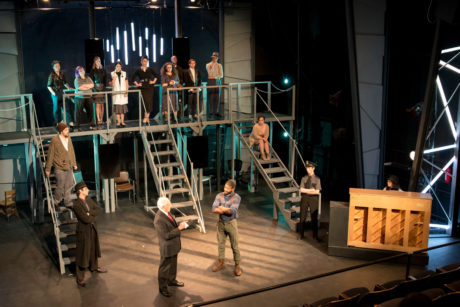
That same exhilaration is fostered in Sean Elias’s outstanding rendition; the director honors the play’s bold history by beginning the show with Musical Director Mandee Ferrier Roberts, alone onstage with a piano. Roberts’s skill and stamina are more than impressive. After dedicating the performance to Bertolt Brecht, who had encouraged Blitzstein to write the musical, she proceeds to play – virtually ceaselessly – for 90 minutes, as her piano is rolled and spun around between scenes to become a variety of set pieces: the counter at Night Court, a desk at the university, the soda fountain bar at the drug store.
My first big wow of the evening came early, the moment Caitlin Weaver, portraying the prostitute, Moll, began signing. My word, Weaver has a beautiful voice! After a bit of a scuffle with Gent (a handsy-but-broke potential customer played by Iron Crow Artistic Associate Terrance Fleming), Moll is “saved” by a corrupt cop (a suitably despicable Matthew Lindsay Payne.) But for refusing his manhandling advances, Moll is taken downtown to be booked for solicitation. When Payne’s sleazy flatfoot answers the phone “Dick here,” my first thought was ‘you got that right, honey.’
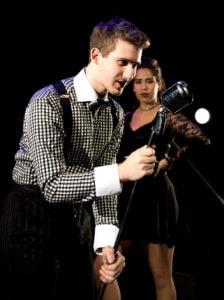
Steeltown USA Night Court is home base for the production. While there, Moll encounters former pharmacy owner Harry Druggist (a heartbroken Johnathan Jacobs), in on vagrancy charges, and an eclectic group of movers and shakers known as Mr. Mister’s Liberty Committee. There was a union rally and newbie cop Virgil (Ian Andrews, hilarious as equal parts earnest and bumbling) had swept up the upright citizens of the anti-union Liberty Committee along with the labor organizers. The society folk voice their dismay with their detainment in the songs “Come to the Rescue” and “Oh, What a Filthy Night Court.”
From here, in a series of tight, well-crafted flashbacks, we learn the backstory of each of the characters and their relationships with their benefactor/extortionist, the corporate fat-cat, Mr. Mister (a very entitled Greg Grenier).
To a person, this cast is first rate. Brandon Love, as Reverend Salvation, and Iron Crow Artistic Associate Allison Bradbury, as Mrs. Mister, perform a pointed, yet funny series of vignettes in which Mrs. pays the Reverend to preach messages that align with her husband’s business interests. With each payment, those messages change along with Mr. Mister’s needs, going from isolationism at the start to full-on warmongering over the course of the snappy duet, “Hard Times/The Sermon.” While Love and Bradbury portray the evolution of their characters’ relationship, the balance of the cast is like a vaudevillian Greek chorus, performing a complicated series of illustrative gestures and movements in perfect unison.
This scene also showcases the musical’s great production design, under Technical Director Sam Martin. Mrs. Mister is gorgeous in the first of her several beautiful outfits by Costume Designer Matthew Smith, with the assistance of Artistic Associate Danielle Harrow. As Reverend Salvation stood, elevated above his congregation, I appreciated the complementary and symmetrical pairing of Chris Miller’s scenic design and Artistic Associate Janine Vreatt’s lighting design. The hanging lights, which changed color in accordance with the mood of the song, evoked a church window over top Miller’s triptych set of steel staircases and catwalk. Window-sized projection screens light up with relevant media clips at various times throughout the show; here, they flash images of Joel Osteen and megachurches.
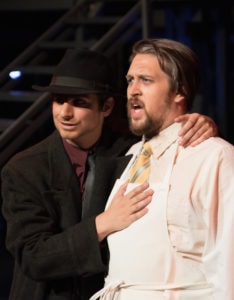
We next watch Steeltown USA newsman, Editor Daily (Justin Johnson, with spot-on comic timing as the reluctant media sellout) be bullied by financier, Mr. Mister, in the catchy duet “The Freedom of the Press.” In the same scene, we’re introduced to the Mister kids – Junior Mister (an uproariously clueless Mark Quackenbush) and Sister Mister (Monica Albizo, as a lusty Kardashianesque teen). Quackenbush steals the scene, his side-splitting physical comedy keeping the audience in stitches in the group number, “Honolulu.”
At the pharmacy, we see how Johnathan Jacobs’s Harry Druggist devolved from the happy neighborhood shop owner to the miserable vagrant Moll meets at Night Court. Iron Crow Artistic Associate Matt Winer is great as the Druggist’s ethical son, Stevie, who tries to get his dad to do the right thing despite serious pressure by the reappearance of Payne’s crooked cop, Dick.
Mark Quackenbush and Monica Albizo also return, this time as pharmacy customers Gus and Sadie Polock. These young actors (Albizo is a recent UMCP Theatre grad and Quackenbush is a Senior at Carver Center for Arts and Technology) each play three connected characters – Junior and Sister Mister, the Polocks, and a team of reporters – and each of their duets is magical. Gus and Sadie’s “Love Duet,” in particular, is both beautiful and poignant.
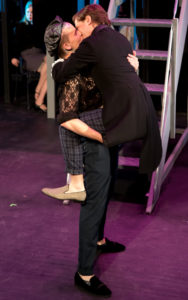
Another delightful coupling is that of the violinist, Yasha (a snobby, foppish Patrick Gorirossi), and the artiste, Dauber (a fabulous, paint-flecked Eduard Van Osterom, an Iron Crow Artistic Associate who, btdubs, rocks my favorite costume of the show). Their songs together – “Don’t Let Me Keep You,” “Ask Us Again” (with Allison Bradbury’s Mrs. Mister) and, especially, “Art for Art’s Sake” have delightful verbal patter and movement.
Mr. Mister’s unchecked strong-arming continues at the university, where he dominates President Prexy (an appropriately jumpy Barbara Madison Hauck) and Professors Mamie, Trixie, and Scoot (Chelsea Paradiso, Meghan Taylor and Matt Winer, respectively).
Perhaps the most painful of Mister’s coercions, though, is that of Dr. Specialist (a distressingly conflicted Roxanne Daneman). Holding the future of her medical career in his hands, Greg Grenier’s dastardly Mr. Mister demands that she give false evidence against a murdered unionist. She has to face Ella Hammer, the sister of the man she’s ordered to betray. Felicia Akunwafor’s delivery of the most heartrending song of the show, “Joe Worker,” literally gave me chills.
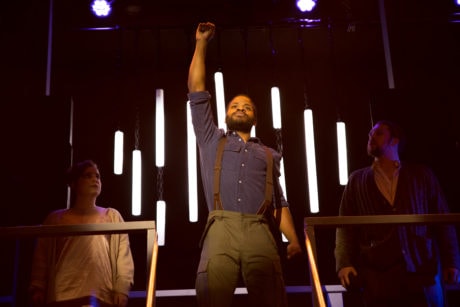
Back at Night Court, we finally meet the one person in town Mr. Mister cannot buy: labor organizer Larry Foreman, played to perfection by Terrance Fleming. Coming out of interrogation, Foreman makes some moving commentary – his assertion, “Now I know how the dirty foreigners feel,” striking me particularly meaningful at this moment in time – before launching into the titular blockbuster “The Cradle Will Rock.” Fleming’s performance is a powerful, rebel-rousing triumph.
This historic musical marks an excellent beginning for Iron Crow’s 2017/18 Season of Identity. As topical today as it was 80 years ago, The Cradle Will Rock – with its superlative cast, beautifully synchronized choreography, and inspired direction by Iron Crow Artistic Director Sean Elias – must appear on your schedule for this weekend. Truly, the only complaint I have about this production is that it won’t be around for longer.
Running Time: One hour and 30 minutes, with no intermission.
The Cradle Will Rock plays through October 8, 2017 at Baltimore Theatre Project – 45 West Preston Street, in Baltimore, MD. For tickets, purchase them at the box office or online.
Note: The Cradle Will Rock explores mature themes, contains adult language, sexual content and violence, and may not be suitable for patrons under the age of 18.





